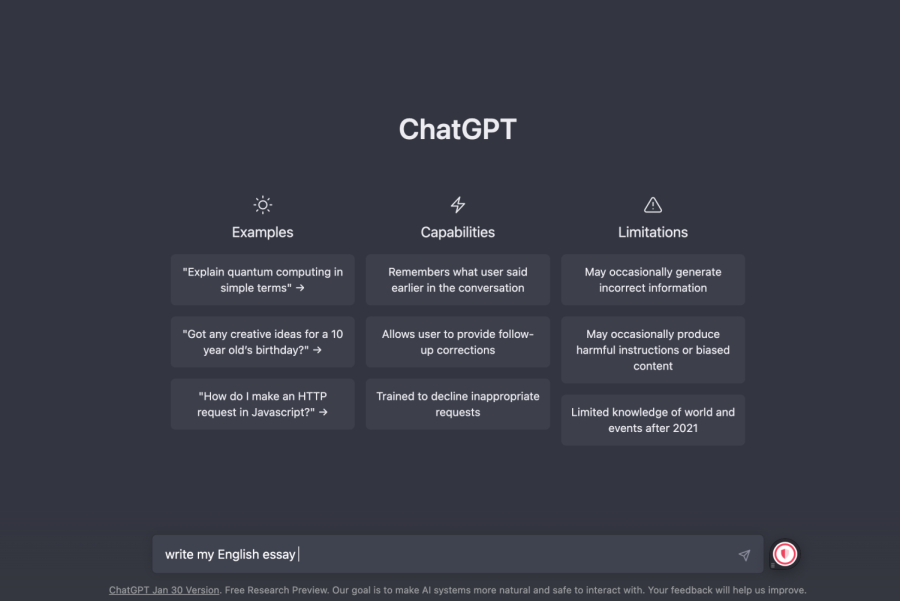ChatGPT lands at Lincoln
ChatGPT’s user interface.
February 13, 2023
The advancement and adoption of technology in schools has been revolutionary for the way students learn. Just forty years ago, to write a research paper, a student would spend hours in the library doing research, writing drafts by hand, and typing a final assignment on a typewriter. Now, a computer can do their assignment in seconds using artificial intelligence.
OpenAI (an artificial intelligence tool developer’s new language model) Chat Generative Pre-trained transformer or ChatGPT, was released in November of 2022 and has exploded across the internet, with extensive press coverage from national news organizations like the New York Times, National Public Radio, and the Washington Post. According to Reuters, ChatGPT set the record for the fastest growing consumer application in history, with 100 million monthly active users just two months after its launch.
The possibilities for misuse of this free technology have raised worries, particularly in the classroom. While plagiarism has always existed, educators say that ChatGPT brings the potential for academic dishonesty into uncharted waters, and teachers don’t know what to expect moving forward.
English teacher Jordan Gutlerner is aware that students could be supplementing their work with work produced by artificial intelligence.
“I’ve been teaching for 23 years now, and I’ve dealt with numerous plagiarism cases. This makes plagiarizing off of the internet or off of SparkNotes quaint. And that temptation is there, so yeah, it’s going to happen, for sure,” said Gutlerner.
The implications of this technology continue to play out even in classes where students are learning a second language. ChatGPT can write text in over 95 different languages including Azerbaijani, Javanese, and Mongolian. Lincoln language teachers are assessing the situation with concern, but Spanish teacher Erik Velasquez is confident he knows the kind of work his students can produce.
“I know the level of my students. So I know the common mistakes that they’re gonna have. If they submit a paper that is completely clean, I will know that it is not from them,” said Velasquez.
As fast as this new technology is adopted, other technologies are being created to constrain it. According to Data Driven Investor, Edward Tian, a Princeton University student, has created an app called GPTZero that uses statistical characteristics to determine whether a text was written by AI or not.
Teachers hope that students understand that when assignments are entrusted to ChatGPT or other AI, learning is not taking place.
“When [you’re going] to be tested, you’re not going to have these resources. And if you’re not honest with yourself, you’re gonna realize that even if you cheat in the class, when you test in IB, you’re gonna fail,” said Velasquez.
Gutlerner feels that it’s essential to go to the root of the problem and address the motivations behind using ChatGPT.
“I’d rather we talked to kids about why they shouldn’t do it. I’d rather we work on this culture of cheating in this school, and every teacher talks to kids about why academic integrity truly is important,” said Gutlerner.
Gutlerner sees the issues as a missed opportunity.
“Every time we use chat GPT, the AI gets smarter. Which is incredibly ironic, because every time we use chat GPT, we don’t get smarter,” he said.




